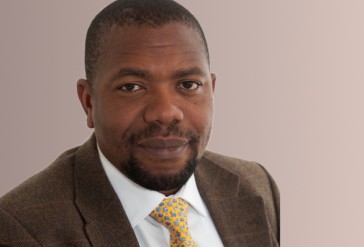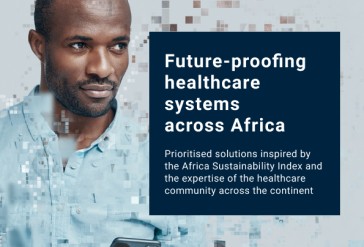Future-proofing healthcare systems across Africa
The policy options included in this white paper focus on actionable recommendations to achieve the transition to Universal Health Coverage and healthcare system sustainability across the continent, based on gaps and best practices identified by the Africa Sustainability Index. The FutureProofing Healthcare advisory panel of experts identified four areas of action as essential to the sustainability of African healthcare systems.
These four areas of action were presented to a broad audience of policymakers, healthcare professionals, researchers, and health experts at the Africa Health Agenda International Conference on 9 March 2021. During this interactive event, the audience heard about best practices which were collectively identified by members of the FutureProofing Healthcare advisory panel of experts. Attendees were also asked for their input on a range of policy recommendations that could contribute to achieving UHC by 2030. These collected insights, combined with the Index and inputs gathered from more than 11,000 health experts across Africa, underpin the proposed policy recommendations and best practices outlined in this paper.
Resources - financial and human - are limited, so this white paper aims to focus on solutions, policy actions and important actors, but most importantly prioritises these. This will enable stakeholders to move forward constructively together to create a more sustainable future for African healthcare.
Key Areas for Action
Four specific areas have been identified by the expert panel:
- closer regional collaboration;
- technologies to improve healthcare delivery;
- re-prioritising healthcare spending;
- improving gender equality in healthcare.
Across all four action areas there are some common priorities and trends identified by the experts and the healthcare community alike. Accountability and transparency, for example, have both begun to appear as essential values in many health systems across Africa. Other common threads relate to the important role of data and evidence in decision-making; sustained political commitment to implement strategies and withstand political pressure from powerful stakeholders; and more effective collaboration between governments and the private sector.
Broader context: the path to Universal Health Coverage (UHC)
These four areas of action were identified by the Africa Sustainability Index expert panel as likely to play a determining role in achieving UHC across the continent. UHC means that any patient anywhere can access essential quality health services without facing financial hardship. By considering the adequacy of health coverage in this way, it is clear that there is an urgent need to address huge inequities in access to healthcare around the world - particularly in lower- and middle-income countries, where providing quality healthcare to everyone remains an elusive goal.
Many African countries have made considerable progress towards UHC, although this has been hindered by COVID-19. The additional stressor on health systems across Africa, already facing significant challenges, has fragmented health systems’ ability to provide undisrupted services to all. COVID-19 forced countries to respond to the immediate issues of health security which may have slowed progress towards UHC. However, the creation of more resilient systems is foundational to achieving sustainable UHC programs. The white paper aims to propose prioritised solutions so stakeholders can move forward constructively together to create a more sustainable future for African healthcare.
Download the Whitepaper
1. How can regional collaborations encourage innovation?
Innovation is a fundamental driver in achieving Universal Health Coverage (UHC) but the Africa Sustainability Index shows that this is an area where Africa, as a continent, lags on the global scale. The “Innovation” Vital Sign, defined as the “advancement, access and application of novel technology” has the lowest average score of any of the six Vital Signs that make up the Africa Sustainability Index. While there are many great examples of countries adopting or even creating technologies to bring new solutions to life, there is still room for growth when it comes to the advancement, access and application of novel technology. For instance, measures related to the use of data for health purposes are relatively low. There is however a clear opportunity to create future-looking policies and legal environments targeted at adopting new technologies.

Dr. Saber Boutayeb, Professor of Medical Oncology at the University of Rabat, Morocco, believes that it is only through regional collaboration within Africa that a true innovation ecosystem can be established. He suggests that the creation of an ERASMUS-like program for African students, and the indexation of African peer-reviewed scientific journals in international databases such as Scopus or Medline could go a long way in increasing regional collaboration. Moreover, solutions that have proven to effectively drive innovation in North Africa can be applied across the continent, i.e. building regional research clusters where countries can i) work together to provide assistance and financing to design innovative research projects, and ii) share data across national borders to allow better healthcare delivery.
2. How can technology speed up system-level changes and improve health delivery?
Data from the Africa Sustainability Index revealed that there are currently strong variations throughout Africa in access to and quality of healthcare services. Data shows Quality and Access are two priority areas that need to be approached holistically by policymakers in order to make an impact in achieving Universal Health Coverage (UHC). For example, many Africans do not receive preventative treatment for reasons outside of their control, predominantly due to distance from healthcare facilities, or a lack of resources.

Seth Akumani of the United Nations Development Program in Ghana believes that, beyond developing appropriate policy solutions, a key remedy to national challenges will be putting technology at the heart of developing sustainable healthcare solutions. Taking advantage of Africa’s massive and still growing mobile accessibility could bring healthcare to people directly. There are already significant mobile initiatives that provide both medical advice and health awareness campaigns to millions of Africans, such as “Be He@lthy, Be Mobile” (BHBM) set up by the WHO and International Telecommunications Union (ITU), and Vodafone's “Mum & Baby” program for expectant parents in South Africa. Limited infrastructure can also be circumvented through the clever use of digital solutions, such as the recent deliveries of COVID-19 tests across Ghana using drones.
3. How can countries re-prioritise healthcare spending to address system gaps?
Financing is not everything and is not always directly correlated with a positive performance on access or quality. In fact, the Index suggests that there is sometimes little difference between the ways African countries finance their healthcare systems. However, similar approaches do not yield similar results in the sustainability of healthcare systems. Index score patterns are suggestive of a definite relationship between economic strength and healthcare system sustainability as we see most of the countries performing well in the “Financing” vital sign, doing well in the Index as a whole.
While there is a clear positive correlation between economic strength, political stability and the sustainability of a healthcare system, there are strong variations in the access to and quality of health services even among the strongest economies. This disparity suggests that, beyond financial reforms, targeted policies to address access and quality indicators could go a long way in achieving UHC. An interesting example here is South Africa, which scores amongst the top three leaders in the “Financing” vistal sign, but scores poorly (last together with Cote d’Ivoire) when it comes to “Status”, indicating persisting structural challenges for the population.

For World Bank Nigeria Health Specialist, Olumide Okunola, it is not simply about having more money flow into healthcare systems, but rather using it intelligently to improve quality overall. Ideally this would mean more health infrastructure, but even more importantly prioritising the poorest and most vulnerable in society – both in rural and urban settings – to ensure they have access to the best possible care.
4. How can healthcare systems further gender equality?
The Index shows that there are differences across the continent on health status between men and women. One stark indicator is access to reproductive health services including family planning, antenatal care, and nursing and midwifery personnel. While there is a positive correlation between access to these services and good maternal and neonatal mortality outcomes, the Index shows that access to reproductive healthcare and family planning is lagging in many African countries. This means that young African women are often the most affected by limited healthcare systems. South Africa scores highest in the “Access” vital sign, due in part performing well in measures assessing access to health services that impact women, whilst a need for improvement is most urgently needed in Sudan, Angola and DRC. Where access is restrained, women’s health takes a toll.

Dr Glenda Gray, President and CEO of the South African Medical Research Council, explained that teenage pregnancy and poverty are inextricably linked, and that young African women are often not prioritised to receive even primary education. Index results show that adult literacy is generally higher among men than women. The link between a lack of literacy and a lower life expectancy should be at the forefront of policy-makers’ minds, as women in Africa remain less likely to be educated.

On 9 March 2021, the Africa Sustainability Index was launched during the African Health Agenda International Conference. During that hour-long discussion, African healthcare experts presented the Index results, what they see as key issues facing Africa’s healthcare today and how these issues can be tackled through collaboration. Particular focus was given to regional collaboration, financing, using technology to tackle system change and gender inequality.









